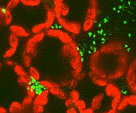Plant Pathology, Department of

Department of Plant Pathology: Faculty Publications
Document Type
Article
Date of this Version
2005
Citation
PNAS, December 27, 2005, vol. 102, no. 52, 19087–19092
Abstract
The most devastating aspect of cancer is the emergence of metastases. Thus, identification of potentially metastatic cells among a tumor cell population and the underlying molecular changes that switch cells to a metastatic state are among the most important issues in cancer biology. Here we show that, although normal human colonic epithelial cells lack the glycosphingolipid globotriaosylceramide (Gb3), this molecule is highly expressed in metastatic colon cancer. In addition, a subpopulation of cells that are greatly enriched in Gb3 and have an invasive phenotype was identified in human colon cancer cell lines. In epithelial cells in culture, Gb3 was necessary and sufficient for cell invasiveness. Transfection of Gb3 synthase, resulting in Gb3 expression in noncancerous polarized epithelial cells lacking endogenous Gb3, induced cell invasiveness. Furthermore, Gb3 knockdown by small inhibitory RNA in colon cancer epithelial cells inhibited cell invasiveness. Gb3 is the plasma membrane receptor for Shiga toxin 1. The noncatalytic B subunit of Shiga toxin 1 causes apoptosis of human colon cancer cells expressing Gb3. Injections of the B subunit of Shiga toxin 1 into HT29 human colon cancer cells engrafted into the flanks of nude mice inhibited tumor growth. These data demonstrate the appearance of a subpopulation of Gb3 containing epithelial cells in the metastatic stage of human colon cancer and suggest their possible role in colon cancer invasiveness.


Comments
© 2005 by The National Academy of Sciences of the USA
www.pnas.org/cgi/doi/10.1073/pnas.0506474102